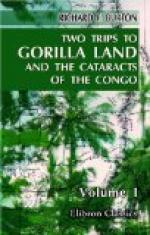It is said that two of a trade never agree, and accordingly we find the hottest wrath of the missioners vented upon their rival brethren, the Ngangas or medicine-men in Africa, and the Pages or Tupi doctors in South America. The priestly presence deprives an idol of all its powers, the sacerdotal power annihilates all charms and devices, “thereby showing that the performances of Christ’s ministers are always above those of the devil’s.” These “Scinghili,” or “Gods of the Earth” (magicians), can sink boats, be ferried over rivers by crocodiles, and “converse with tigers, serpents, lions and other wild animals.” The “great ugly wizards” are “sent martyrs to the devil” on all possible occasions. One father soundly belabours one of these “wicked Magi” with the cord of his order, invoking all the while the aid of Saint Michael and the rest of the saints: he enters the “hellish tabernacle, arming himself frequently with the sign of the cross,” but he retreats for fear of a mischief from the “poor deluded pagans,”—showing that he is, after all, but an “unbelieving Thomas.” On the other hand, the wizards solidly revenged themselves by killing and eating Father Philip da Salesia. And the deluded ones must have found some difficulty in discovering the superiority of exotic over indigenous superstitions. When there is a calm at sea the sailors stick their patron against the mast, and kneeling before him say, “Saint Antony, our countryman, you shall be pleased to stand there, till you have given us a fair wind to continue our voyage!” A certain bishop of Congo makes the sign of the cross upon a “banyan-tree,” whereupon it immediately died, like the fig-tree cursed by our-Saviour. A ship is “sunk in a trice” for not having a chaplain on board her. The missioners strongly recommend medals, relics, Agni-Dei, and palm-leaves consecrated on Palm Sundays. They rage furiously against and they flog those who wear “wizards’ mats,” against magic cords fastened round young children as amulets, and against the teeth and bones of animals, and cloth made from the rind of certain trees carried as preservatives from disease and supernatural influences: even banners in burial-places are “superstitious and blamable.” They claim the power of stopping rain by cursing the air, and of producing it by prayer, and by “a devout procession to Our Lady of Pinda,” a belief truly worthy of the Nganga; and a fast ship is stranded that “men may learn to honour holidays better.” When the magicians swear falsely they either burst like Judas or languish and die—“a warning to be more cautious how they jest with God.” An old hag, grumbling after a brutish manner, proceeds to bewitch a good father to death by digging a hole and planting a certain herb. The ecclesiastic resolved to defeat her object by not standing long in one place. He remembers the saying of the wise man, “Mulier nequam plaga mortis;” and at last by ordering her off in the name of the Blessed Trinity and the Holy Virgin, “withal




